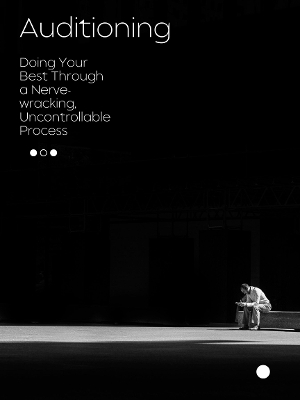Student Blog: Auditioning - Doing Your Best Throughout a Nerve-Wracking, Uncontrollable Process
Need advice on how to nail your next audition? Look no further to learn how you can feel in control throughout an uncontrollable process.
 Auditioning is an integral part of being an actor. Some even say that auditioning is the job. While this statement seems like a stretch, it emphasizes the importance of being able to audition well, in order to get a callback and hopefully a role and even a job. In a college setting, auditions are an important aspect of an aspiring actor's educational experience, enabling them to practice the art of auditioning while providing possible opportunities to act in front of others. Given that most college and university semesters are underway, theatre departments and student theatre organizations are preparing for or are in the process of conducting auditions for this semester's productions. With so many exciting shows to be a part of yet limited casting space, it is easy to become overwhelmed while transitioning from one audition to the next. To help your future auditions be successful, below are some tips and tricks that I have learned from auditioning throughout the past few years.
Auditioning is an integral part of being an actor. Some even say that auditioning is the job. While this statement seems like a stretch, it emphasizes the importance of being able to audition well, in order to get a callback and hopefully a role and even a job. In a college setting, auditions are an important aspect of an aspiring actor's educational experience, enabling them to practice the art of auditioning while providing possible opportunities to act in front of others. Given that most college and university semesters are underway, theatre departments and student theatre organizations are preparing for or are in the process of conducting auditions for this semester's productions. With so many exciting shows to be a part of yet limited casting space, it is easy to become overwhelmed while transitioning from one audition to the next. To help your future auditions be successful, below are some tips and tricks that I have learned from auditioning throughout the past few years.
First and foremost, it is important to recognize that the audition begins before you even enter the room and perform for the directors. Your audition actually begins when you enter the building. Make sure to arrive early, so you can have time to fill out necessary paperwork and absorb whatever else is required before getting started. In addition, this gives you time to assess the situation and to complete your final mental preparation for the audition. Remember to also have materials, such as your resume and headshot, readily available. At the audition sign-in, it is imperative to be cordial, respectful, and attentive to those that are running the auditions. The people checking you in are oftentimes the production stage managers or other individuals very close to the production and its directors, so treating them well will help you get your audition process off to the right start.
After waiting a few minutes, or sometimes longer if the directors are running behind, you will be asked into the audition room. Upon entering, take a deep breath and smile. Within the first few moments, you want to convey that you are engaged, approachable, and collaborative. Clearly state your name to the directors and take the opportunity to ask questions that you might have before starting. If you are presenting prepared material, remember your pacing and do not let being nervous cause you to rush through your monologue or song. Treat the audition as if it is another rehearsal, another chance to continue working through the piece. If you are given materials to read cold, take a moment to read through them, asking yourself who the character is, where they are, and what they want. If you are unclear as you are preparing, ask the directors for clarification and additional context. Although you will be reading from a piece of paper, make sure to react and respond to your scene partner whether it's a director or an invisible person to whom you are directing your comments in the monologue. Again, speak clearly and go slowly through the piece, moving when it feels right.
After presenting the piece, directors will sometimes give you notes, asking you to give it another try. This is a great sign because it means they want to work with you and to see if you can take direction. So, follow their suggestions and see where it leads. At the end of the audition, the directors may ask you questions to which you should answer cordially. Most times, they will also ask you if you have questions for them. This is a great chance to ask them fundamental questions about their vision for the show or simple questions about the next steps in the process. Your questions will signal to them that you are interested and invested in the production. While walking out, thank the directors and the people who signed you in. After exiting the building, celebrate what you did, take time to let go and relax before going onto your next activity for the day.
Whether in college or working as an actor in the real world, auditioning is hard because you are presenting versions of yourself to be judged and fitted into the mold of a specific character in a specific production. Although some say auditioning is the job, I disagree. Auditioning is simply a tool that allows you to promote yourself and your art as directors willingly look for actors. No matter if you are auditioning this semester or the next, following these tips and tricks can help you maintain your wits in a nerve-wracking process.
Videos


